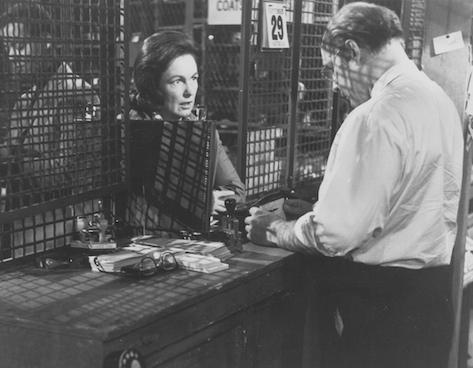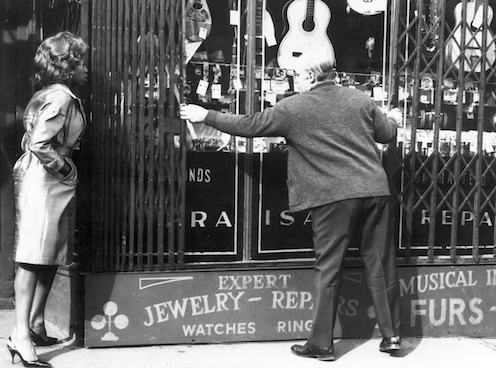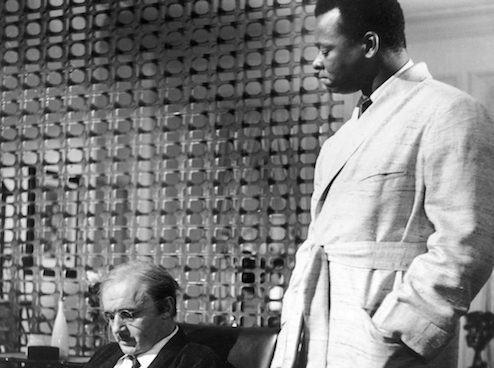The Pawnbroker
Full Description
In the same year that The Sound of Music won the Oscar for Best Picture, with its cheery portrayal of a singing family fleeing the Nazis, Hollywood (predictably) nearly overlooked Sidney Lumet’s extraordinary psychological portrait of a survivor, The Pawnbroker. This gritty black-and-white film, shot on location in and around New York’s Harlem, features the breathtaking performance of Rod Steiger as Sol Nazerman; a lonely, bitter pawnbroker resigned to spend his days offering small sums of cash for the pathetic collateral of his customers. Steiger plays Nazerman as one of the walking dead -- his only real connection to humanity is with his eager apprentice Jesus Ortiz (the irrepressible Jaime Sanchez), whose enthusiasm for life seems almost physically repulsive to Nazerman. They are on a collision course as inevitable as Nazerman’s escalating flashbacks, inserted erratically and brilliantly by editor Ralph Rosenblum, working with Lumet (Serpico, Network, The Verdict).
The Pawnbroker is one of the first American films to deal squarely with the lingering impact of the Holocaust on those who lived through it. But there is nothing sentimental about the film. It has a hard-edged, noir sensibility, and a grim humor. Lumet’s fiercely imagined, intimately observed New York is enlivened by Quincy Jones’ bold jazz score and a refreshing cast of African-American and Latino character actors. But most memorable is Steiger as a Jew who dares not feel his own pain -- his silent scream, near the film’s end, is one of the indelible film images of our time.
Filmmaker Bio(s)
Perhaps not as celebrated as Martin Scorsese, Steven Spielberg or Stanley Kubrick, Sidney Lumet is a prestigious, well-respected director of emotionally intense films with unorthodox protagonists. Many of Lumet's movies are set in New York City, and the metropolis is almost a character itself in classics like The Pawnbroker (1965), Serpico (1973), Dog Day Afternoon (1975), Prince of the City (1981) and The Verdict (1982).
Lumet's connection to New York stories began early; fittingly he was that most New York of characters -- a Dead End Kid -- in the original Broadway production. Lumet also acted in Yiddish theater and other Broadway productions before turning to directing. He cut his teeth during TV's "Golden Age," working behind the camera on many live CBS dramas during the 1950s.
Henry Fonda helped Lumet rework the teleplay Twelve Angry Men (1957) for the screen, and his first big screen effort was met with nominations for Best Picture and Best Director. He followed the classic jury drama with all-star theatrical screen adaptations of Tennessee Williams' The Fugitive Kind (1960), Eugene O'Neill's Long Day's Journey Into Night (1962), and Arthur Miller's A View From the Bridge (1962). He followed these with two compelling dramas: Fail-Safe (1964), a cold war cautionary tale; and The Pawnbroker (1965), with Rod Steiger as a haunted Holocaust survivor.
Lumet hit a slump in the late Sixties, but bounced back with The Anderson Tapes (1971) and The Offence (1973), an intense look at police brutality that prefigured the riveting cop dramas to come. Several commercial successes followed, beginning with Al Pacino in Serpico (1973), then the Grand Hotelesque star-studded whodunit Murder on the Orient Express (1974). He showcased another sensational Pacino performance in Dog Day Afternoon (1975) and went on to make the prescient TV satire, Network (1976). Both classics garnered nominations for Best Picture and Director.
His subsequent films are a mixed bag, including the Motown alumni-rich musical The Wiz (1978) and another theatrical adaptation, Equus (1977). Then there was also the wry but less-than-successful sex comedy Just Tell Me What You Want (1980). He returned to familiar territory of past successes with the brilliant police corruption drama Prince of the City (1981) and with Paul Newman as a conflicted lawyer in The Verdict (1982). (For the latter Lumet again earned nominations for Best Picture and Director.) He went on to direct a thinly veiled account of the Rosenberg case, Daniel (1983); his first film shot in Hollywood, a romantic thriller called The Morning After (1986); and then a feature about underground 60s activists, Running on Empty (1988). Lumet's exploration of a bigoted cop in Q &A (1990) marked a return to the gritty dramas he does so well.
Though recent years have seen less successful crime films set in his beloved New York -- Melanie Griffith in A Stranger Among Us (1992), Guilty as Sin (1993), and 1997's Night Falls on Manhattan -- in 1993 Lumet received the D.W. Griffith Award from the Directors Guild of America.
One a personal note, Lumet has two daughters and has wed four times, including marriage to Gloria Vanderbilt (yes, the Gloria Vanderbilt) and to Lena Horne's daughter, Gail Jones.
Director(s)
Country(ies)
Language(s)
Release Year
Festival Year(s)
Running Time
116



